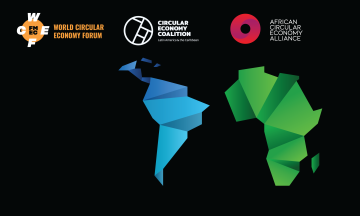
The African Circular Economy Alliance (ACEA) and the Circular Economy Coalition of Latin America and the Caribbean (CEC LAC) organized the first regional dialogue to strengthen cooperation around their common objectives.
The dialogue – Regional deep-dive: Africa, Latin America & the Caribbean joining forces for circularity – took place on 15 September as part of the World Circular Economy Forum 2021, and was organized by Sitra and Environment & Climate Change Canada. It marked the first steps for greater collaboration among the two regions, whose respective countries are pursuing efforts to scale circularity through the promotion of effective public policies and the creation of investment opportunities.
ACEA and CEC LAC are joining forces for financing circularity with the support of the Global Opportunities for SDGs (GO4SDGs) and UNEP Finance initiatives on the study on financial mechanisms for circularity in both regions. ACEA is hosted by the African Development Bank while CEC LAC is hosted by the United Nations Environment Programme (UNEP).
The event was launched by the environment ministers of Colombia and Rwanda Mr. Carlos Correa and Mrs. Jeanne d'Arc Mujawamariya, who underlined the role that the circular economy can play in driving a green recovery post-COVID-19. Being key advocates in their respective regions, both countries are also part of the Global Alliance on Circular Economy and Resource Efficiency.
A panel moderated by James Mwangi, Executive Director of Dalberg, brought together key circular economy practitioners, entrepreneurs, academics and champions from Africa and Latin America, who discussed the need to scale up the transition towards circular economies.
“The circular economy is a key puzzle piece to reach the climate targets,” said Gonzalo Muñoz, Chile's High-Level Climate Champion for the UN Climate Change Conference COP25. “It will be instrumental in driving the change in key sectors. Latin America and Africa can be frontrunners in this journey where governments and industry work together.”
During the meeting, entrepreneurs from both regions showcased business models that small and medium-sized enterprises (SMEs) are undertaking to achieve a circular economy.
“The circular economy is not a new concept to Africa,” said Wanjiru Waweru Waithaka, Founder and CEO of FunKidz. “From our traditional building techniques to the way we stored water and food, we did not waste, nor depend on factory-produced items. We need to go back into our cultures and relearn how to live in and with nature.”
This includes all members of society.
“I have no doubt that Africa’s youth will be a game-changer for the circular economy,” said Anthony Nyong, Regional Director of the Global Center on Adaptation (GCA) Africa. “Africa is the continent where most of its infrastructure needed is yet to be built. There is an opportunity to build climate-resilient systems that provide jobs for the youth.”
Nyong also announced a call for applications for the first African Youth Adaptation Solutions (YouthAdapt) Challenge launched by GCA and the African Development Bank.
The key takeaways of the event echoed the outcomes of the first High-level Meeting of the Global Alliance on Circular Economy & Resource Efficiency (GACERE), held the day before, where environment ministers of several countries and representatives from multilateral organizations emphasized the need for stronger regional cooperation to accelerate the adoption of the circular economy model worldwide.
Representing the African Development Bank, Hamdou Dorsouma, Acting Director for Climate Change and Green Growth, said policies, financing and the upskilling of African youth and workers will be key enablers for the circular economy transition.
With its strong climate benefits, most notably the reduction of greenhouse gas emissions, the circular economy is likely to be on the COP26 agenda, which will be held in November 2021 in Glasgow, Scotland.
Full recording is available.
